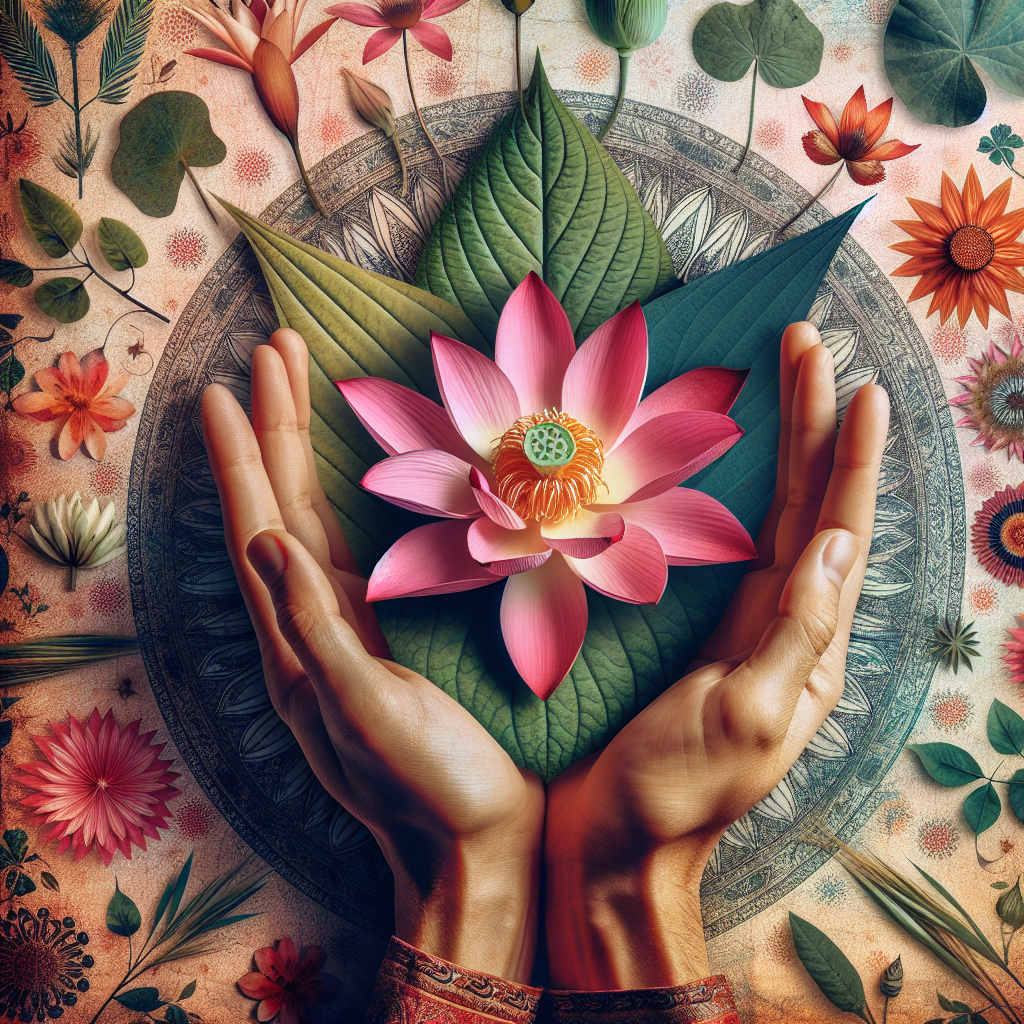In India’s Integrative Medicine Centers, a world of holistic healing awaits you in the heart of the country. Offering an immersive experience that combines top-notch healthcare and wellness with a fascinating glimpse into India’s vibrant culture, these centers have become a haven for medical tourism. From ancient Ayurvedic treatments to state-of-the-art integrative therapies, there is a wide range of options available to cater to your individual needs. Discover the wonders of alternative medicine while immersing yourself in the rich traditions and practices that have been passed down through generations. Embark on a journey of self-discovery and rejuvenation as you embark on a transformative experience in India’s Integrative Medicine Centers: Holistic Healing.

Overview
Welcome to our comprehensive guide on integrative medicine in India! In this article, we will delve into the fascinating history, benefits, therapies, top centers, holistic approaches, research and development, medical tourism, and the future of integrative medicine in India. Integrative medicine combines conventional Western medicine with complementary and alternative therapies to provide a holistic approach to healthcare.
History of Integrative Medicine in India
Ancient Ayurveda Practices
Integrative medicine has deep roots in India, dating back thousands of years. Ancient Ayurveda, one of the world’s oldest holistic healing systems, forms the foundation of integrative medicine in India. Ayurveda emphasizes the importance of balance and harmony between the body, mind, and spirit for optimal health. It incorporates various natural therapies, including herbal medicines, dietary adjustments, detoxification, and lifestyle modifications.
Contribution of Sushruta Samhita
Sushruta Samhita, an ancient Sanskrit text written by Sushruta, an Indian physician, is considered a cornerstone in the history of integrative medicine in India. Sushruta Samhita provides detailed knowledge about surgical techniques, including plastic surgery, which were way ahead of their time. It showcases the early integration of surgery and natural therapies, reinforcing the holistic approach of Indian medicine.
Influence of Yoga and Meditation
Yoga and meditation, integral components of Indian culture, play a significant role in integrative medicine. Yoga, with its diverse range of asanas (postures) and pranayama (breathing techniques), strengthens the body and calms the mind. It promotes overall well-being, reduces stress, and enhances flexibility. Meditation, on the other hand, cultivates mindfulness and inner peace, facilitating the mind-body connection essential for holistic healing.

Benefits of Integrative Medicine
Comprehensive Approach to Health
One of the major advantages of integrative medicine is its comprehensive approach to health. It recognizes that each individual is unique and treats the whole person, considering physical, emotional, mental, and spiritual aspects. By addressing the root causes of illness, rather than merely treating symptoms, integrative medicine aims to restore and maintain optimal health and wellness.
Natural and Non-Invasive Treatments
Integrative medicine emphasizes the use of natural and non-invasive treatments whenever possible. It harnesses the healing power of nature, utilizing herbal remedies, nutrition, and lifestyle modifications to promote healing. By avoiding harsh medications and invasive procedures, integrative medicine minimizes potential side effects and facilitates the body’s self-healing mechanisms.
Promotion of Overall Well-being
Integrative medicine not only focuses on treating diseases but also places a strong emphasis on promoting overall well-being. It aims to prevent illness by optimizing health through healthy lifestyle choices, stress reduction techniques, and mind-body practices. By taking a proactive approach to health, integrative medicine empowers individuals to become active participants in their own well-being.
Integrative Medicine Therapies
Ayurveda
Ayurveda, as mentioned earlier, plays a pivotal role in integrative medicine in India. It employs various therapies, including herbal medicines, diet and nutrition, panchakarma (detoxification), yoga, and meditation, to restore balance and promote health. Ayurvedic treatments are individualized, taking into account one’s unique constitution (dosha), and aim to address the underlying imbalances causing illness.
Yoga and Meditation
Yoga and meditation are integral components of integrative medicine in India. Yoga combines physical postures, breath control, and meditation techniques to promote physical, mental, and spiritual well-being. It improves flexibility, strength, and mental clarity while reducing stress, anxiety, and depression. Meditation cultivates mindfulness and reduces the impact of stress on the body, facilitating healing and balance.
Naturopathy
Naturopathy is a system of medicine that utilizes natural therapies to support the body’s inherent healing capacity. It employs various modalities, including nutrition, herbal medicine, hydrotherapy, and lifestyle counseling, to address the underlying causes of disease. Naturopathy focuses on prevention, education, and empowering patients to make informed choices about their health.
Acupuncture
Originating in traditional Chinese medicine, acupuncture has gained popularity in integrative medicine in India. It involves the insertion of thin needles into specific points on the body to stimulate energy flow and restore balance. Acupuncture has been found effective in managing pain, promoting relaxation, and improving overall well-being.
Homeopathy
Homeopathy is a system of medicine based on the principle of “like cures like.” It uses highly diluted substances derived from plant, mineral, or animal sources to stimulate the body’s natural healing response. Homeopathy aims to address the individual’s unique symptoms, considering physical, mental, and emotional aspects, to restore equilibrium.
Herbal Remedies
Herbal remedies hold a prominent place in integrative medicine. India’s rich biodiversity provides a wide array of medicinal plants with therapeutic properties. Herbal medicines are used to alleviate symptoms, support the body’s healing process, and promote overall health. They are often prescribed in combination with other natural therapies for optimal results.

Top Integrative Medicine Centers in India
All India Institute of Medical Sciences (AIIMS)
AIIMS, located in New Delhi, is a premier medical institution in India. While renowned for its allopathic treatments, it also offers integrative medicine services. AIIMS provides holistic care through its Ayurveda, yoga, and naturopathy departments, offering treatment, research, and education in these ancient healing practices.
Jindal Naturecure Institute, Bangalore
Jindal Naturecure Institute in Bangalore is a prominent center for integrative medicine. It emphasizes naturopathy, yoga, and natural healing techniques. The institute offers personalized treatment plans and holistic programs that focus on lifestyle modifications, nutrition, hydrotherapy, and other natural therapies.
Vedanta Wellness, Gurugram
Vedanta Wellness in Gurugram combines ayurvedic treatments, yoga, and meditation to provide comprehensive care. It offers individualized treatment plans, detoxification programs, stress management, and lifestyle counseling services. Vedanta Wellness aims to promote sustainable wellness practices for long-term benefits.
The Ayurvedic Village, Pune
Located in Pune, The Ayurvedic Village is dedicated to Ayurvedic healing. It offers an oasis of calm and serenity for rejuvenation and wellness. The center provides personalized Ayurvedic treatments, tailored to individual needs, and focuses on holistic healing through Ayurvedic therapies, yoga, and meditation.
Art of Living Retreat Center, Bangalore
The Art of Living Retreat Center in Bangalore is a renowned destination for spiritual growth, wellness, and yoga. It offers a range of programs that emphasize holistic healing, including Ayurveda, yoga, meditation, and the Art of Living teachings. The center provides a serene environment for relaxation, self-reflection, and personal growth.
Holistic Approach at Integrative Medicine Centers
Individualized Treatment Plans
Integrative medicine centers in India adopt a personalized approach to treatment. They recognize that each individual is unique and develop tailored treatment plans considering the person’s specific needs, preferences, and health goals. This individualized approach aims to address the root causes of illness and promote optimal healing.
Combining Eastern and Western Medicine
One of the key aspects of integrative medicine centers is the integration of Eastern and Western medical practices. By combining the best of both worlds, these centers provide a comprehensive approach to healthcare. They recognize the strengths of each system and utilize them synergistically to offer the most effective treatments.
Focus on Mind-Body Connection
Integrative medicine centers understand the interconnectedness of the mind and body. They emphasize the mind-body connection and its impact on health and healing. By incorporating practices such as yoga, meditation, and mindfulness training, these centers facilitate the cultivation of self-awareness, stress reduction, and emotional well-being.
Research and Development in Integrative Medicine
Collaborations with Global Institutes
Integrative medicine centers in India actively collaborate with global institutes to promote research and development. These collaborations foster the exchange of knowledge, expertise, and research findings, facilitating advancements in integrative medicine. By merging the traditional wisdom of Indian healing practices with contemporary scientific research, these centers strive to enhance patient care and outcomes.
Clinical Trials and Evidence-Based Practices
Research in integrative medicine focuses on strengthening the evidence base for its effectiveness and safety. Integrative medicine centers in India conduct clinical trials and research studies to evaluate the efficacy of various therapies and treatments. By adopting evidence-based practices, these centers ensure the highest quality of care and contribute to the advancement of the field.
Advancements in Integrative Medicine
The field of integrative medicine in India is constantly evolving and embracing advancements in science and technology. Researchers and practitioners are exploring innovative approaches, such as genomics, personalized medicine, and mind-body interventions, to enhance the understanding and application of integrative medicine. These advancements hold the potential to revolutionize healthcare and improve patient outcomes.
Medical Tourism in India
Rising Popularity of Medical Tourism
India has emerged as a popular destination for medical tourism due to its world-class healthcare facilities and affordable treatments. Integrative medicine centers play a significant role in attracting international patients seeking holistic healing. The availability of a wide range of therapies, highly trained medical professionals, and the opportunity for cultural immersion make India an appealing destination for medical tourists.
Cost-Effective Treatments
One of the primary reasons for the popularity of medical tourism in India is the cost-effectiveness of treatments. Integrative medicine centers offer high-quality care at a fraction of the cost compared to Western countries. This affordability allows patients to access holistic treatments they may not otherwise be able to afford in their home countries.
Cultural Immersion and Travel Opportunities
Medical tourism in India provides patients with the unique opportunity to immerse themselves in the country’s rich culture and heritage. Alongside their healing journey, patients can explore India’s vibrant cities, historical sites, and natural wonders. This combination of healthcare and travel experiences offers a truly enriching and transformative experience.
Challenges and Future of Integrative Medicine
Integration into Mainstream Healthcare
Though integrative medicine has gained recognition and popularity, integrating it into mainstream healthcare remains a challenge. The incorporation of complementary and alternative therapies into conventional healthcare systems requires collaboration, acceptance, and the development of appropriate protocols. Education of healthcare professionals and public awareness are crucial for the integration of integrative medicine into mainstream healthcare.
Regulation and Standardization
Another challenge in the field of integrative medicine is the regulation and standardization of therapies and practitioners. Ensuring the safety, quality, and efficacy of treatments is essential. The development of regulations, accreditation standards, and robust quality control measures will help safeguard patients and foster trust in integrative medicine.
Awareness and Acceptance
More efforts are needed to raise awareness and promote acceptance of integrative medicine among the general public and healthcare professionals. Enhancing understanding about the benefits, safety, and evidence base of integrative medicine will contribute to its wider acceptance and integration into healthcare systems. Education, research, and public advocacy play vital roles in increasing awareness and acceptance of integrative medicine.
Conclusion
Integrative medicine in India offers a comprehensive and holistic approach to health and healing. Rooted in ancient Ayurveda and influenced by yoga, meditation, and other natural therapies, integrative medicine centers provide a range of treatments that address physical, emotional, mental, and spiritual well-being. With a focus on personalized care, mind-body connection, and the integration of Eastern and Western medicine, these centers have gained prominence in medical tourism and are at the forefront of research and development. While facing challenges, the future of integrative medicine in India looks promising, fostering a path towards a more holistic and patient-centered approach to healthcare.
